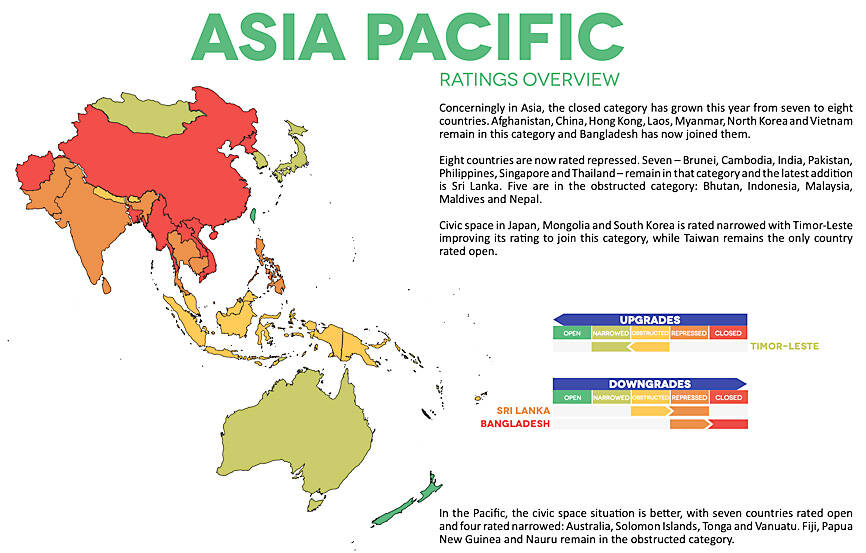Taiwan remains the only country in Asia with an “open” civic space for the fifth consecutive year, the Civicus Monitor said in a report released yesterday.
The People Power Under Attack 2023 report named Taiwan as one of only 37 open countries or territories out of 198 globally, and the only one in Asia.
Compiled by Civicus — a global alliance of civil society organizations dedicated to bolstering civil action — the ranking compiled annually since 2017 measures the state of freedom of association, peaceful assembly and expression around the world.

Photo courtesy of Civicus Monitor
Researchers assign each country or territory one of five rankings describing the state of its civic space as open, narrowed, obstructed, repressed or closed.
This year, 37 were considered open, 43 were narrowed, 40 were obstructed, 50 were repressed and 28 were closed.
By population, only 2.1 percent of people live in open societies — half the percentage reported six years ago — while 40.3 percent are in repressed societies and 30.6 percent are in closed societies.
Eight of the 26 countries or territories in Asia were rated as closed, up from seven last year, as Bangladesh joined China, Hong Kong, North Korea, Vietnam, Laos, Myanmar and Afghanistan in the bottom ranking.
Citing Reporters Without Borders data, Civicus said that Taiwan ranked 35th globally for press freedom and the government generally respects those freedoms.
Taiwan has a rich media environment, and the government respects and upholds its people’s liberties and rights of assembly, allowing the public to protest without undue limitations, the report said.
In contrast, Bangladesh launched a sweeping and violent crackdown on opposition parties ahead of general elections, arresting nearly 10,000 activists, and has been downgraded to the lowest rank.
Sri Lanka has also been downgraded to repressed after it continued to crack down on dissidents and activists.
Josef Benedict, a Civicus researcher covering the Asia-Pacific region, said that with the civic space in the region continuing to shrink, Taiwan maintaining an open civic space is positive, as it shows that human rights and civic space development in the region are not all bad, and that some nations are still serious about their international responsibilities.
Taiwan has become a haven for journalists and dissidents from other nations, allowing them to continue their work safely, he added.
Countries that want to develop their civic spaces should look to Taiwan to learn from it, he said.
However, Taiwan has room for improvement, Benedict said, adding that the defamation laws under Article 310 of the Criminal Code could be used to oppress freedom of speech.
While there is freedom to form unions in Taiwan, the nation also has strict rules against strikes, he said.

Seventy percent of middle and elementary schools now conduct English classes entirely in English, the Ministry of Education said, as it encourages schools nationwide to adopt this practice Minister of Education (MOE) Cheng Ying-yao (鄭英耀) is scheduled to present a report on the government’s bilingual education policy to the Legislative Yuan’s Education and Culture Committee today. The report would outline strategies aimed at expanding access to education, reducing regional disparities and improving talent cultivation. Implementation of bilingual education policies has varied across local governments, occasionally drawing public criticism. For example, some schools have required teachers of non-English subjects to pass English proficiency

‘FORM OF PROTEST’: The German Institute Taipei said it was ‘shocked’ to see Nazi symbolism used in connection with political aims as it condemned the incident Sung Chien-liang (宋建樑), who led efforts to recall Democratic Progressive Party (DPP) Legislator Lee Kun-cheng (李坤城), was released on bail of NT$80,000 yesterday amid an outcry over a Nazi armband he wore to questioning the night before. Sung arrived at the New Taipei City District Prosecutors’ Office for questioning in a recall petition forgery case on Tuesday night wearing a red armband bearing a swastika, carrying a copy of Adolf Hitler’s Mein Kampf and giving a Nazi salute. Sung left the building at 1:15am without the armband and apparently covering the book with a coat. This is a serious international scandal and Chinese

TRADE: The premier pledged safeguards on ‘Made in Taiwan’ labeling, anti-dumping measures and stricter export controls to strengthen its position in trade talks Products labeled “made in Taiwan” must be genuinely made in Taiwan, Premier Cho Jung-tai (卓榮泰) said yesterday, vowing to enforce strict safeguards against “origin laundering” and initiate anti-dumping investigations to prevent China dumping its products in Taiwan. Cho made the remarks in a discussion session with representatives from industries in Kaohsiung. In response to the US government’s recent announcement of “reciprocal” tariffs on its trading partners, President William Lai (賴清德) and Cho last week began a series of consultations with industry leaders nationwide to gather feedback and address concerns. Taiwanese and US officials held a videoconference on Friday evening to discuss the

PERSONAL DATA: The implicated KMT members allegedly compiled their petitions by copying names from party lists without the consent of the people concerned Judicial authorities searched six locations yesterday and questioned six people, including one elderly Chinese Nationalist Party (KMT) member and five KMT Youth League associates, about alleged signature forgery and fraud relating to their recall efforts against two Democratic Progressive Party (DPP) legislators. After launching a probe into alleged signature forgery and related fraud in the KMT’s recall effort, prosecutors received a number of complaints, including about one petition that had 1,748 signatures of voters whose family members said they had already passed away, and also voters who said they did not approve the use of their name, Taipei Deputy Chief Prosecutor